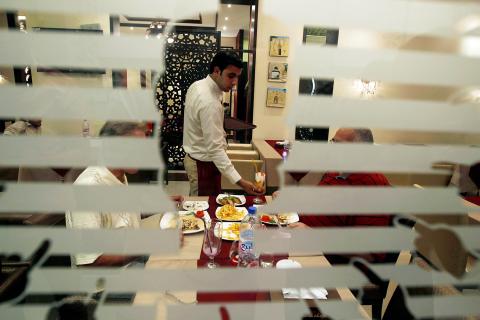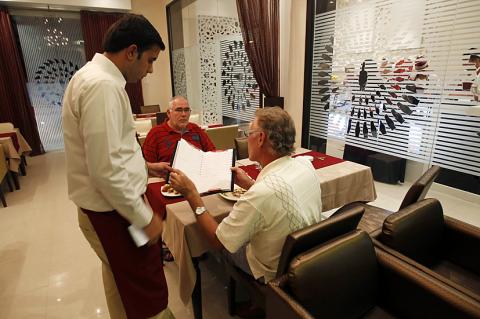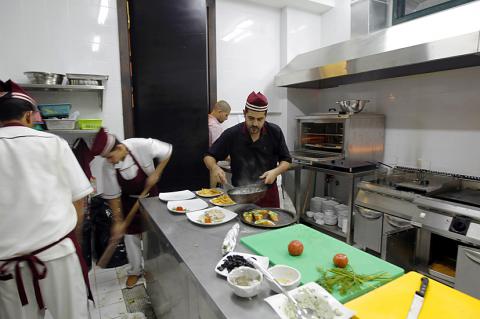At first glance, the Atfaluna restaurant in Gaza City looks like any other — a space for locals to enjoy a simple meal. However, there’s a difference: Nearly all its staff are deaf.
Inside, customers chat with each other and scan the menu, but when it comes to ordering, their requests are taken down by waiters who communicate in sign language, and their meals are all cooked by deaf chefs.
It’s a one-of-a-kind concept in Gaza and the brainchild of a local organization called Atfaluna — Arabic for “Our Children” — which works to improve the lives of the territory’s deaf.

AFP PHOTO/MOHAMMED ABED
The project has the twin goals of raising awareness about the needs and capabilities of the deaf, while giving the community a way to earn a living in a place where unemployment stands at 45 percent.
Ahmed Dahman, expressing himself shyly through a sign language translator, described how working at the restaurant has changed his life.
“It gave me a sense of security regarding my future and self-dependency because job opportunities were virtually non-existent before this,” he said.

AFP PHOTO/MOHAMMED ABED
“We’ve seen a lot of support and cooperation from people,” he said. “A lot of them expressed their interest in learning sign language.”
For Dahman and others employed at the restaurant, where sign language letters decorate the walls, Atfaluna is a rare opportunity for work.
Until a few months ago, education opportunities for the deaf in Gaza only ran to ninth grade, with no secondary or university level education available.

AFP PHOTO/MOHAMMED ABED
A new secondary school has just opened, and Atfaluna is working with universities to make courses available for the deaf, but most working-age members of the community find themselves with few marketable skills.
“There is a real shortage of jobs for deaf people in Gaza. Of course they are at a big disadvantage because of the educational shortages,” said Dalia Abu Amr of Atfaluna.
Diners enter through an elaborate arabesque doorway above which hangs the restaurant’s name written in white on a black background — in English, Arabic and sign language.
Inside, a hostess in a traditionally-embroidered Palestinian gown guides people to their table. Handicrafts made in Atfaluna’s job creation programs are also available for sale.
The fare on offer ranges from Middle Eastern staples like hummus and baba ghanoush to fried fish, chicken or curry dishes.
“We came here to see the place,” said Shahd al-Iyla, a 21-year-old student dining with a friend. “It was nice, we would love to come here to offer moral support, so we will come again.”
Abu Amr said 12 of the restaurant’s 14 staff are deaf. The only exceptions are the chef and the accountant, who answers the phone to take reservations and delivery orders.
“The team of 12 deaf workers received culinary and hospitality training,” Abu Amr said. The project hopes “to assimilate the deaf in Gaza into society and provide them with work opportunities.”
Around 1.5 percent of Gazans over the age of five have some form of hearing disability, according to Atfaluna, but the disability still carries a stigma.
“No one welcomes the idea of a deaf person working in Gaza,” said 35-year-old Niveen al-Quqa, as she garnished a dish about to leave the kitchen.
She took art classes and sewing lessons in a bid to find work, but until the restaurant opened, she had had no success.
Now she is one of five women employed at Atfaluna — four in the kitchen and one working as a waitress.
“I am looking forward to improving my culinary skills so my colleagues and I can prove ourselves, despite our disability. I am very happy now,” she added with a smile.
The restaurant’s chef, 30-year-old Hassan Addabus, hovered nearby as his charges worked, giving them pointers on their technique in sign language.
“I have been doing this for 10 years and it was always about doing a job I love, but today it means much more than that,” he said. “It has a moral and human significance because of the support it offers to people with disabilities in our society who deserve all of our help.”
Amina al-Omari, 22, also hard at work in the kitchen, said the job had given her a new sense of self.
“Society has no idea about our needs,” she explained. “I felt subject to injustice and oppression because of this, but those feelings started to fade away after I started working here and becoming independent.”
“We are capable of proving our skills and excellence. We might be deaf, but we have a lot of potential,” she added.

April 14 to April 20 In March 1947, Sising Katadrepan urged the government to drop the “high mountain people” (高山族) designation for Indigenous Taiwanese and refer to them as “Taiwan people” (台灣族). He considered the term derogatory, arguing that it made them sound like animals. The Taiwan Provincial Government agreed to stop using the term, stating that Indigenous Taiwanese suffered all sorts of discrimination and oppression under the Japanese and were forced to live in the mountains as outsiders to society. Now, under the new regime, they would be seen as equals, thus they should be henceforth

Last week, the the National Immigration Agency (NIA) told the legislature that more than 10,000 naturalized Taiwanese citizens from the People’s Republic of China (PRC) risked having their citizenship revoked if they failed to provide proof that they had renounced their Chinese household registration within the next three months. Renunciation is required under the Act Governing Relations Between the People of the Taiwan Area and the Mainland Area (臺灣地區與大陸地區人民關係條例), as amended in 2004, though it was only a legal requirement after 2000. Prior to that, it had been only an administrative requirement since the Nationality Act (國籍法) was established in

Three big changes have transformed the landscape of Taiwan’s local patronage factions: Increasing Democratic Progressive Party (DPP) involvement, rising new factions and the Chinese Nationalist Party’s (KMT) significantly weakened control. GREEN FACTIONS It is said that “south of the Zhuoshui River (濁水溪), there is no blue-green divide,” meaning that from Yunlin County south there is no difference between KMT and DPP politicians. This is not always true, but there is more than a grain of truth to it. Traditionally, DPP factions are viewed as national entities, with their primary function to secure plum positions in the party and government. This is not unusual

US President Donald Trump’s bid to take back control of the Panama Canal has put his counterpart Jose Raul Mulino in a difficult position and revived fears in the Central American country that US military bases will return. After Trump vowed to reclaim the interoceanic waterway from Chinese influence, US Defense Secretary Pete Hegseth signed an agreement with the Mulino administration last week for the US to deploy troops in areas adjacent to the canal. For more than two decades, after handing over control of the strategically vital waterway to Panama in 1999 and dismantling the bases that protected it, Washington has